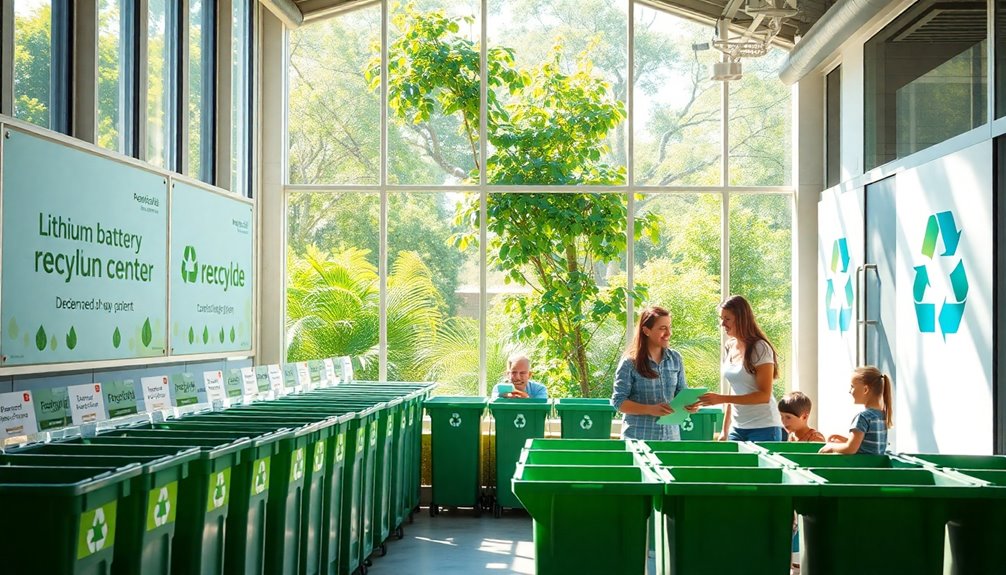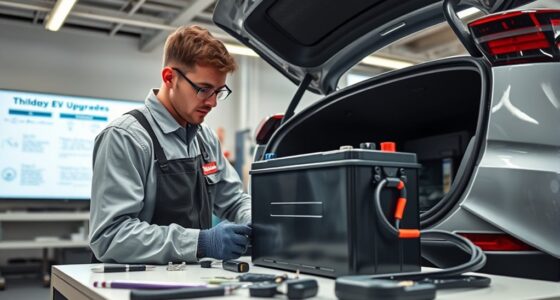You can easily find eco-friendly locations to recycle lithium batteries and help protect the environment. Major retailers like Best Buy, Home Depot, and Lowe's have drop-off bins specifically for battery recycling. The Call2Recycle program also offers tools to locate nearby recycling points. Don't forget to check local waste management facilities that handle hazardous waste. Additionally, community collection events often make recycling more accessible. Just be certain to cover battery terminals with tape and store them safely before disposal. Keep exploring for more tips on responsible recycling and ways to guarantee your batteries get the right treatment!
Key Takeaways
- Electronics retailers like Best Buy and Batteries Plus accept lithium battery drop-offs for eco-friendly recycling.
- Home improvement stores such as Home Depot and Lowe's provide designated battery recycling bins.
- The Call2Recycle program helps locate nearby recycling drop-off locations and facilities.
- Local waste management facilities often handle hazardous waste recycling, including lithium batteries.
- Community collection events organized by municipalities promote responsible battery disposal and recycling efforts.
Importance of Recycling Lithium Batteries
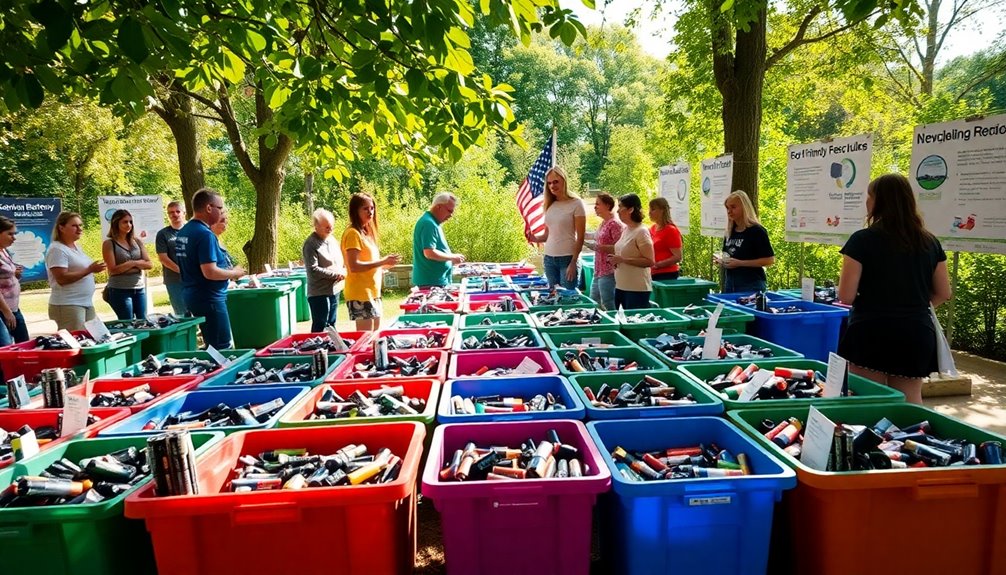
Recycling lithium batteries is essential for protecting our environment and conserving resources. When you recycle, you help recover valuable materials like lithium, cobalt, and nickel, which reduces the need for new raw material extraction.
Improperly disposing of these batteries can lead to hazardous materials leaching into the soil and water, causing widespread contamination. By choosing to recycle, you're not only preventing toxic materials from harming the environment but also saving up to 90% of the energy required to produce new batteries.
This contributes to lower greenhouse gas emissions and less landfill waste, addressing the alarming 180,000 tons of battery waste generated annually. Your responsible recycling practices can promote sustainability and guarantee a healthier planet for future generations.
Eco-Friendly Disposal Methods
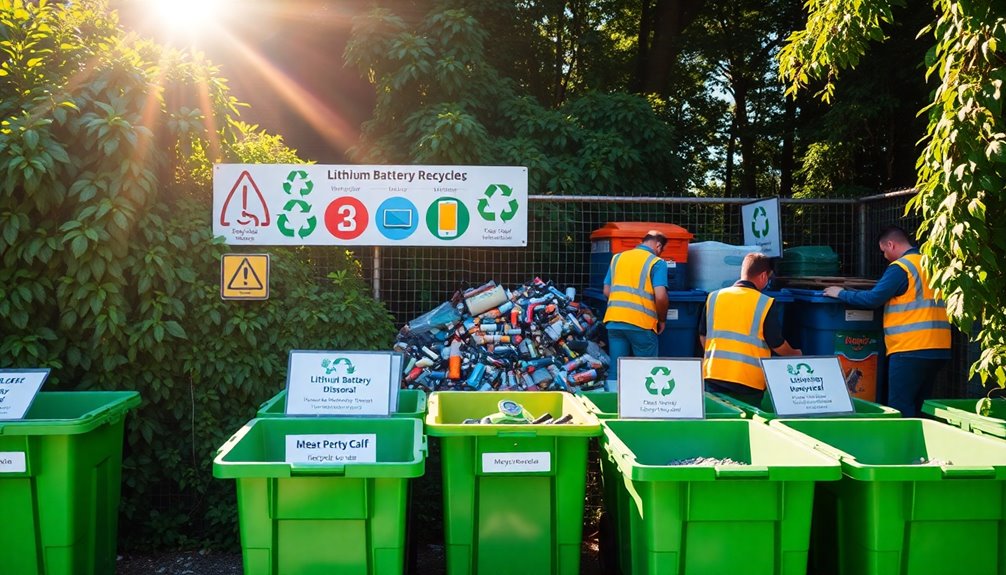
Taking care of lithium batteries doesn't end with recycling; it also involves choosing the right disposal methods.
To guarantee you recycle your batteries responsibly, always take them to designated recycling facilities. Improper disposal can lead to hazardous chemical leaks that harm the environment.
Many retailers, like Best Buy and Home Depot, provide convenient battery recycling drop-off bins specifically for rechargeable batteries. Additionally, the Call2Recycle program offers a nationwide locator tool to help you find local drop-off locations.
You can also participate in community events that hold battery collection drives, promoting environmental awareness.
Before transporting your batteries, remember to cover the terminals with tape to prevent short-circuiting and guarantee safe handling during the recycling process.
Top Locations for Recycling

Finding the right place to recycle your lithium batteries is easier than ever, with numerous options available. You can drop off batteries at electronics retailers like Best Buy and Batteries Plus Bulbs, or check out home improvement stores such as Home Depot and Lowe's. They all support the responsible disposal of batteries.
Here's a quick reference table to help you find recycling options near you:
| Location Type | Examples |
|---|---|
| Electronics Retailers | Best Buy, Batteries Plus |
| Home Improvement Stores | Home Depot, Lowe's |
| Recycling Programs | Call2Recycle |
| Local Waste Management | Hazardous Waste Facilities |
Utilizing these collection events and drop-off points makes it simple to participate in eco-friendly practices!
Community Collection Events

If you've got lithium batteries to recycle, community collection events offer a great opportunity to dispose of them safely and responsibly.
Organized by local municipalities or environmental groups, these events provide a designated time and place for residents to properly dispose of batteries. Many partner with recycling programs, ensuring your batteries are processed sustainably—contributing to the recycling of over 17 million pounds annually.
Plus, these events usually offer free drop-off services, making it easy and cost-effective for you. They also raise awareness about the importance of battery recycling and proper disposal methods, helping to reduce landfill waste and protect the environment from harmful chemicals.
Retail Drop-Off Points
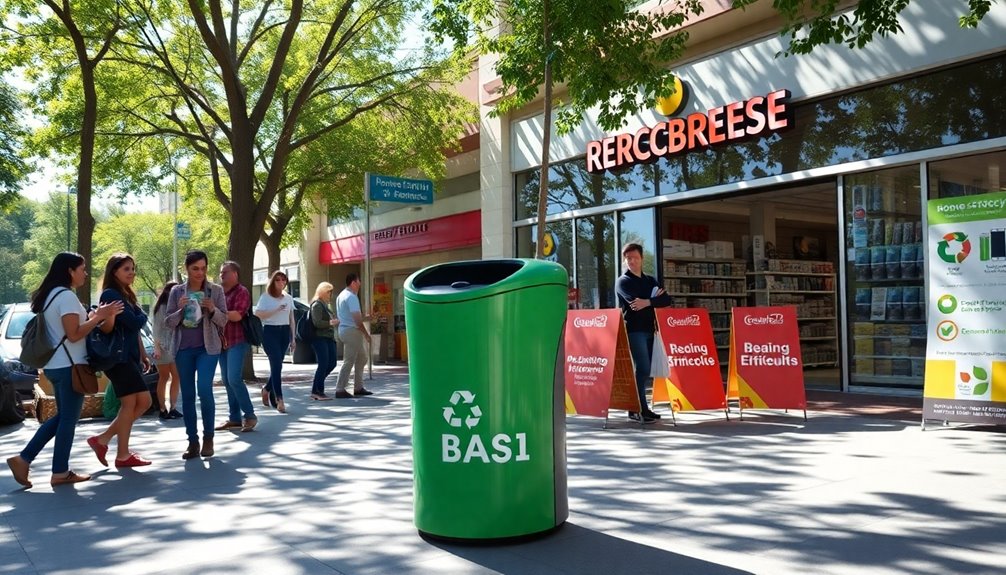
You can easily recycle lithium batteries at local retail collection sites, thanks to major retailers like Best Buy and Home Depot.
These stores have bins specifically for battery disposal, making it simple for you to participate in eco-friendly practices.
Local Retail Collection Sites
Many retailers offer convenient drop-off points for recycling lithium batteries, making it easier than ever to dispose of them responsibly.
Stores like Best Buy, Home Depot, Lowe's, and Staples have dedicated bins for old batteries, ensuring eco-friendly disposal.
You can easily locate a nearby recycling center by using the Call2Recycle locator tool, which helps you find out your shipping options for battery recycling.
Most retail collection sites are open during regular business hours, so you won't have to worry about limited access.
By recycling lithium batteries at these locations, you help recover valuable materials, reduce environmental impact, and conserve natural resources.
It's a simple step that makes a big difference!
Major Retailers Participation
Numerous major retailers are stepping up to support lithium battery recycling by providing convenient drop-off points across the country.
Home Depot, in partnership with Call2Recycle, offers bins specifically for rechargeable batteries, including lithium-ion types, at many locations.
Best Buy also makes it easy for you to recycle by accepting both rechargeable and single-use lithium batteries while you shop for electronics.
Lowe's participates as well, providing drop-off points for rechargeable batteries, contributing to a sustainable waste management approach.
You'll typically find these recycling bins near the customer service areas, ensuring easy access for anyone looking to dispose of old batteries responsibly.
Mail-In Recycling Options
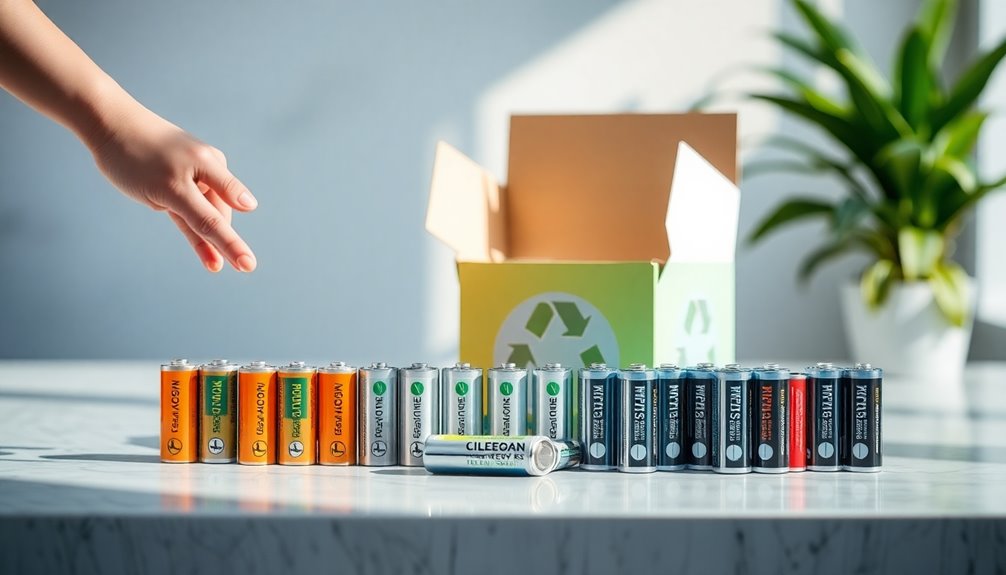
As people become more environmentally conscious, mail-in recycling options for lithium batteries offer a convenient and responsible way to dispose of these hazardous items.
Mail-in recycling programs, such as Call2Recycle, provide kits that include containers for safely collecting and shipping your used rechargeable batteries. You can easily request a prepaid shipping label online, making the process cost-free.
Many programs accept various types of lithium batteries from electronics and power tools. To guarantee safe transport, remember to tape over battery terminals and securely pack them to prevent leakage or short-circuiting.
Types of Lithium Batteries
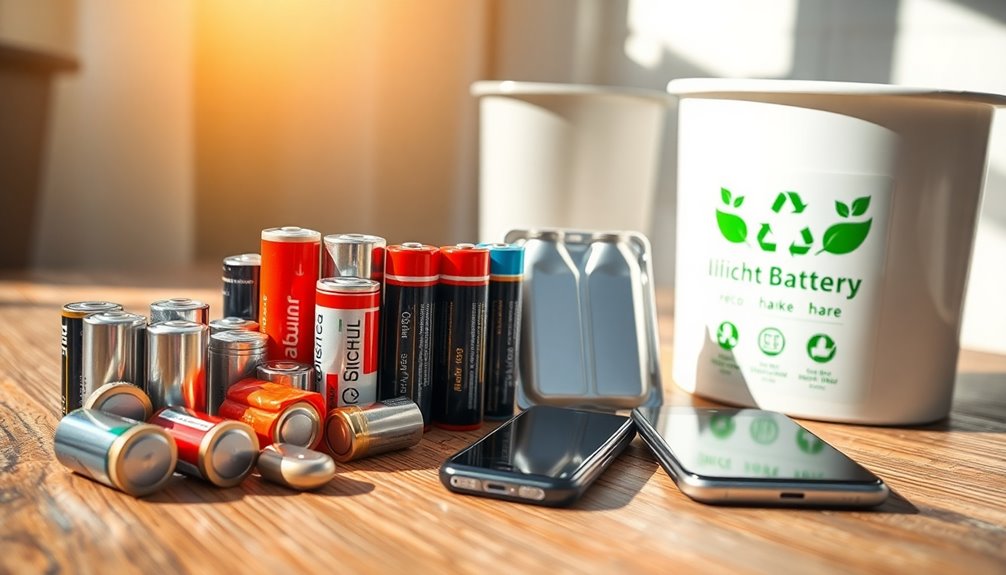
When it comes to lithium batteries, you'll find several types, each suited for specific applications.
From the widely used lithium-ion batteries in your smartphone to the specialized lithium iron phosphate batteries in electric vehicles, understanding these variations is essential.
Plus, knowing their impact on the environment when disposed of improperly highlights the importance of recycling.
Common Lithium Battery Types
Lithium batteries come in various types, each designed for specific applications and performance needs. Understanding these types helps you choose the right battery for your needs.
Here's a quick overview of common lithium battery types:
- Lithium-Ion Batteries: Found in smartphones and laptops, known for high energy density and rechargeability.
- Lithium Polymer Batteries: Lightweight and flexible, ideal for drones and RC vehicles.
- Lithium Iron Phosphate Batteries: Excellent thermal stability and long cycle life, used in electric vehicles and solar storage.
- Lithium Manganese Dioxide Batteries: High discharge rates, often used in medical devices and power tools.
- Primary Lithium Batteries: Non-rechargeable, perfect for long-term power in cameras and smoke detectors.
Knowing these types can guide you in making eco-friendly choices during disposal.
Applications of Lithium Batteries
Understanding the different types of lithium batteries sets the stage for exploring their diverse applications. These batteries power a wide range of devices, showcasing their versatility. Here's a quick overview:
| Battery Type | Common Uses | Key Features |
|---|---|---|
| Lithium-ion Batteries | Smartphones, laptops, tablets | High energy density, rechargeable |
| Lithium Iron Phosphate (LiFePO4) | Electric vehicles, energy storage | Thermal stability, safety |
| Lithium Polymer Batteries | Drones, wearables | Lightweight, flexible |
Lithium-ion batteries are the go-to for portable electronics, while vehicles use lithium iron phosphate batteries for efficient energy storage. Recycling batteries helps reduce waste and conserve resources, making it essential for sustainable practices.
Environmental Impact of Disposal
Improper disposal of lithium batteries poses serious environmental risks, as these batteries contain hazardous materials that can leach into the soil and water.
This contamination threatens human health and wildlife, leading to significant ecological harm.
Here are some essential points to take into account:
- Lithium batteries can release toxic substances.
- They contribute to the 180,000 tons of battery waste in the U.S. annually.
- Recycling can recover valuable materials like lithium and cobalt.
- Proper disposal helps protect the environment by reducing pollution.
- Recycling saves up to 90% of the energy needed to produce new batteries.
Safety Precautions for Disposal
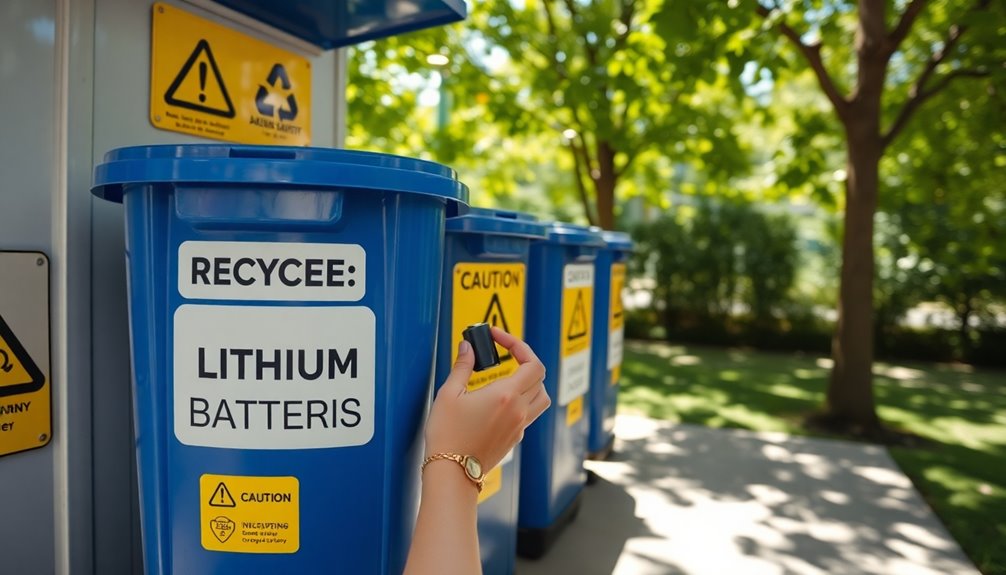
When it comes to disposing of lithium batteries, taking safety precautions is essential to prevent accidents and environmental harm.
Always tape over the terminals of used batteries, especially 9-volt ones, to avoid short-circuiting and fire risks during transport.
Store them in a cool, dry place, away from sunlight and heat sources, to minimize leakage and fire hazards.
Avoid mixing different battery types in the same disposal container, as this can lead to dangerous reactions.
When handling damaged or leaking batteries, wear gloves to protect yourself from harmful substances.
Finally, follow local disposal requirements for battery collection to guarantee you're choosing the safest option for recycling lithium batteries and preventing environmental contamination.
Environmental Impact of Improper Disposal
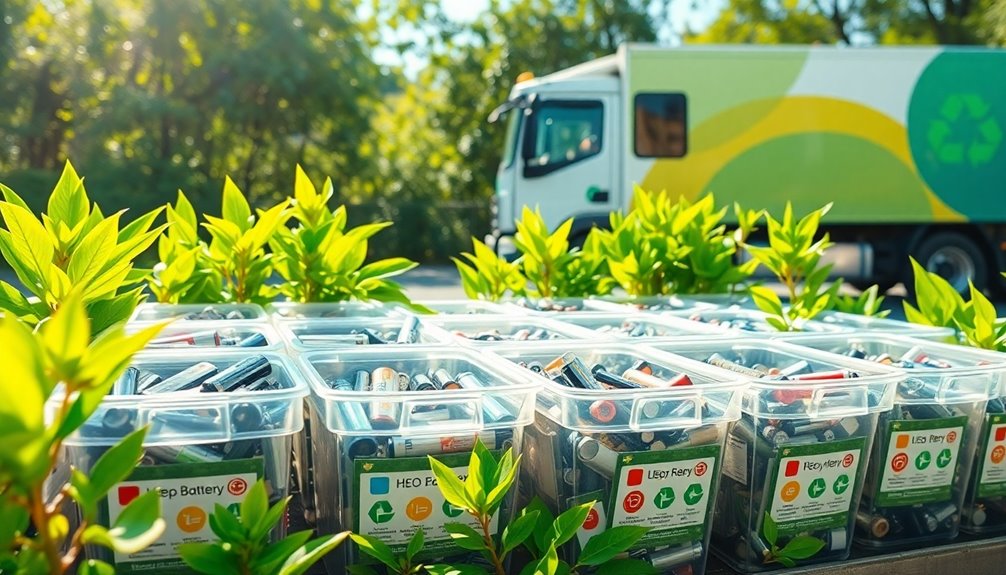
The environmental consequences of discarding lithium batteries carelessly can be severe, as these devices contain hazardous materials that can leak into the soil and waterways. This improper disposal threatens ecosystems and human health.
Here's what you need to know:
- Toxic substances like lithium, cobalt, and nickel can persist in the environment for years.
- Contaminated soil and water can harm wildlife and plants.
- Batteries can pose a fire hazard in landfills due to punctures or short circuits.
- Approximately 180,000 tons of battery waste is generated annually, increasing landfill overflow.
- Recycling lithium batteries helps recover valuable materials and saves up to 90% of the energy needed for new battery production.
Proper recycling is essential for protecting our environment.
Resources for Responsible Recycling
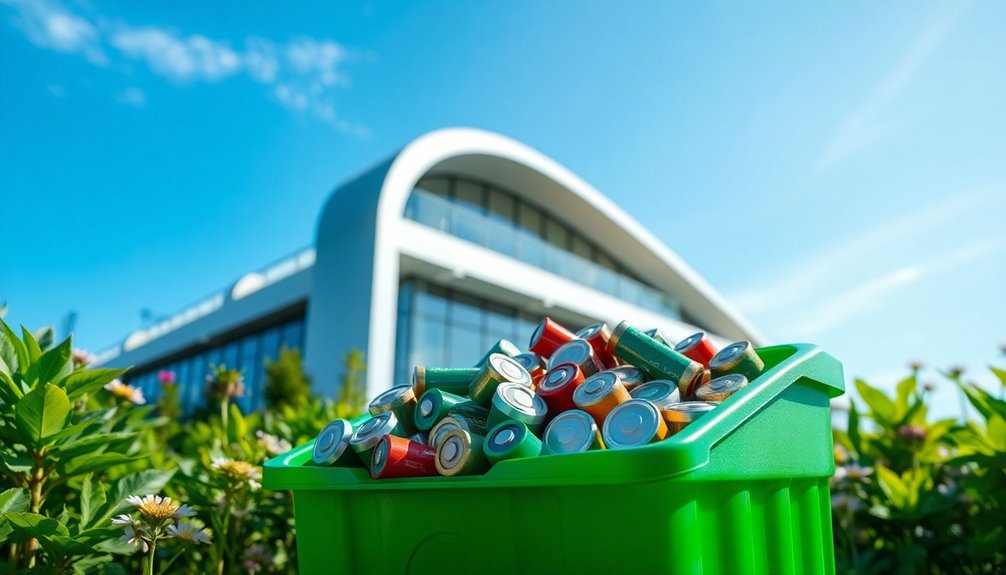
How can you guarantee that your lithium batteries are recycled responsibly? Start by using designated drop-off locations and recycling centers. Retailers like Best Buy and Home Depot partner with programs like Call2Recycle, making proper disposal easy. You can also check your municipality for household hazardous waste facilities that accept lithium batteries.
Here's a quick reference table for your convenience:
| Location Type | Examples |
|---|---|
| Retailers | Best Buy, Home Depot |
| Municipal Facilities | Local hazardous waste sites |
| Environmental Events | Community recycling days |
| Online Resources | Call2Recycle locator tool |
| Collection Bins | In-store drop-off options |
Participating in community events organized by environmental organizations can also guarantee eco-friendly disposal.
Frequently Asked Questions
Where Can I Take Lithium Batteries to Be Recycled?
You can take your lithium batteries to various local drop-off locations for recycling.
Check major retailers like Best Buy and Home Depot, as they often have bins specifically for battery collection.
Additionally, look for hazardous waste collection events in your municipality or use the Call2Recycle program to find nearby facilities.
Just remember to tape the terminals before you transport them to prevent any short-circuiting during the recycling process.
Does Home Depot Accept Lithium Batteries for Recycling?
You walk into Home Depot, the scent of fresh wood and paint filling the air.
You'll be glad to know that they accept lithium batteries for recycling! Just look for the designated bins in the store, perfect for dropping off those used batteries from your gadgets.
It's a simple step towards protecting our planet, and you can feel good about recycling while recovering valuable materials and keeping harmful waste out of landfills.
Does Lowe's Recycle Lithium Batteries Near Me?
Yes, Lowe's does recycle lithium batteries near you!
You can find designated battery recycling bins at participating Lowe's stores across the U.S. It's simple—just drop off your used lithium batteries during your shopping trips.
The program, in partnership with Call2Recycle, guarantees that your batteries are processed responsibly.
To locate the nearest participating store, check the store locator feature on the Lowe's website or app.
It's a great way to help the environment!
How Do I Dispose of My Lithium-Ion Batteries?
Ever wondered what happens to your lithium-ion batteries when you toss them in the trash? You shouldn't!
Instead, you can dispose of them safely by taking them to designated recycling centers or participating retailers like Best Buy or Home Depot.
Just tape over the terminals to prevent short circuits and find a nearby drop-off location using resources like Call2Recycle.
Conclusion
In the words of Benjamin Franklin, "An ounce of prevention is worth a pound of cure." By recycling lithium batteries responsibly, you're not just protecting the environment; you're ensuring a healthier future for everyone. With various drop-off points and community events available, it's easier than ever to dispose of these batteries safely. So, take a moment to find your nearest recycling location and contribute to a cleaner, greener planet—every little bit helps!

